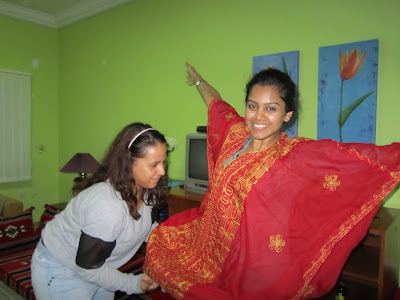
The way I act, speak and dress is socially acceptable in Qatar, but all of this changes when I visit Sudan. I have to alter all of these social norms with the conformity of the culture, otherwise it would be regarded as deviance. In sociology, these types of norms that are known as folkways which are the "regular" ways to handle everyday habits. In Qatar my folkways are very different from when I am in Sudan. For example, I'm used to speaking English most of the time with my friends, but as soon as I'm around my family or other Sudanese I switch to my own colloquial Arabic. I also tend to dress differently and modestly by wearing a headscarf to abide with the culture and the people. Seldom would you find a Sudanese woman in Sudan not wearing a scarf. The headscarf is a symbol of religion, but the role of religion is so significant that it has influenced culture which makes it hard to distinguish between the two. What's interesting is that even women that are not Muslim wear the headscarf just so they can fit in because it's something that is expected of you as a woman. Here you can observe how people of a certain group that have a certain mentality, social belief and culture have used social control -methods that influence and indirectly force both "members and non-members, to comply with and not deviate from its norms and expectations." If anyone was found to violate any of these social rules, sanctions would be implemented. These can be formal sanctions that are supported by the law, or informal meaning that they can be given anyone in that society and are not supported by the law. Both these forms of sanctions can be negative or positive. An example of a negative informal sanction is when my grandmother giving me a long lecture about speaking Arabic more often because it's my mother tongue and that I'm becoming more of a western and less of an Arab. Dressing conservatively is required in Sudanese law; therefore if a someone is caught not dressed appropriately they would be dealt with the religious police.

Similarly to Sudan, Qatar is a Muslim and Arab country, but I don't apply these social norms because in the end it is not my culture. For example Qatari women wear the abaya in their home country but not necessarily when they travel. However, if I don't wear accordingly to tradition no one would care simply because I'm not Qatari and therefore these unwritten social rules do not apply to me. That is why when I'm not in Sudan I don't feel the need to follow the rules. This social pressure that I experience is a form of social control that forces me to dress accordingly modestly according to my culture, religion and family. In the end it is hard to agree on what is considered to be deviant behavior because each society establishes its own conformity that differ from each other, so what might be regarded as deviant in one society could be considered normal in another.














